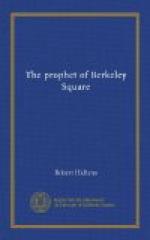“Young man, you talk idly! What are companies formed for if not to make profits?” retorted Sir Tiglath. “Every one is a company nowadays. Don’t you know that? Murchison, the famous writer of novels, is a company. Jeremy, the actor-manager, is a company. So is Bynion the quack doctor, and the Rev. Mr. Kinnimer who supplies tracts to the upper classes, and Upton the artist, whose pictures make tours like Sarah Bernhardt, and Watkins, whose philosophy sells more than Tupper’s, and Caroline Jingo, who writes war poems and patriotic odes. If you were to invite these supposed seven persons to dinner, and all of them came, you would have to lay covers for at least fifty scoundrels. Oh-h-h-h!”
“Well, but how are you sure that—ahem—the Almanac person is also plural, Sir Tiglath?” inquired Mrs. Merillia.
“Because I sought him with the firm intention of assault and battery for five-and-forty years,” returned the astronomer. “And only gave up my Christian quest when I was assured, on excellent authority, that he was a company, and had originally been formed in the United States for the making of money and the defiance of the heavenly bodies. May bulls and bears destroy him!”
“Well, it’s very odd,” said Lady Enid. “Very odd indeed.”
As she spoke she glanced at the Prophet and met his eyes. There are moments when the mere expression in another person’s eyes seems to shout a request at one. The expression in the Prophet’s eyes performed this feat at this moment, with such abrupt vehemence, that Lady Enid felt almost deafened. She leaned back in her chair, as if avoiding a missile, and exclaimed,—
“Of course! And I never guessed it!”
“Guessed what, my dear?” inquired Mrs. Merillia.
“Why, that—he—it—was a company,” replied Lady Enid.
The Prophet blessed and thanked her with a piercing and saved look.
“Nor I,” he assented, descending into the very mine of subterfuge for his recent oath’s sake, “nor I, or I should never have taken the useless trouble that I have taken.”
He managed to say this with such conviction that his grandmother, who, in the past, had always found him to be transparently honest and sincere, was carried away by the deception. She wrinkled her long nose, as was her habit when sincerely pleased, and cried gaily,—
“Then, Hennessey, now you’ve heard Sir Tiglath’s opinion of the practice of trying to turn the stars into money-makers, and the planets into old gipsy women who tell fortunes to silly servant girls, I’m sure you’ll never study them again. Come, promise me!”
The Prophet made no answer.
“Hennessey,” cried his grandmother, with tender pertinacity, “promise me! Sir Tiglath, join your voice to mine!”
Sir Tiglath had become really grave, not theatrically serious.




